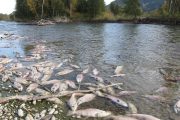
The proposed law, introduced this week in Congress for the third time, would require energy companies to disclose chemicals used in hydraulic fracturing, and most importantly, close a loophole that exempts drilling operators from drinking water regulations. It is being hailed by environmentalists as a step toward increasing the power and regulatory reach of the Environmental Protection Agency, which in turn, will increase the national deficit, boost government spending, and increase the reach of the federal government.
The legislation seeks to regulate and ultimately eliminate the practice of hydraulic fracking, which is the process by which natural gas is obtained in the United States from regions that have the proper geological composition conducive to natural-gas production. In fracking, fractures are created in rocks, and are extended by internal fluid pressure which opens the fracture and causes it to extend through the rock. Man-made fluid-driven fractures are formed at depth in a borehole and extend into targeted formations. The fracture width is typically maintained after the injection by introducing a proppant into the injected fluid. Proppant is a particulate material, such as grains of sand or ceramic, that prevents the fractures from closing when the injection is stopped.
The technique of hydraulic fracturing is used to increase or restore the rate at which fluids such as oil, gas, or water can be produced from a reservoir, including unconventional reservoirs such as shale rock or coal beds. Hydraulic fracturing enables the production of natural gas and oil from rock formations deep below the earth’s surface (generally 5,000-20,000 feet). This method of harvesting natural gas has raised numerous criticisms from environmentalists, who believe that hydraulic fracturing causes ground water contamination, air pollution, the migration of waste materials and dangerous chemicals to the surface (soil pollution), and the mishandling of industrial waste.
Such individuals continue to raise criticism against natural-gas production in the United States, even documenting these claims in the 2010 documentary Gasland. This despite the EPA’s 2004 report, which concluded that the process was safe and didn’t warrant further study because there was "no unequivocal evidence" of health risks, and the fluids were neither necessarily hazardous nor able to travel far underground.
In addition, a 2009 Energy Department report concluded that the chemicals in use have been adequately disclosed through Material Safety Data Sheets (MSDS) available on the OSHA website and that additional regulation is burdensome. Currently, under the Energy Policy Act of 2005, there is an exemption from regulation of hydraulic-fractured wells being re-classified as injection wells, which would place them under federal regulation under the Safe Drinking Water Act, which was originally intended to regulate disposal wells.
Despite these realities, Democrats are firmly against the practice of hydraulic fracturing, and believe that the regulatory exemption under the 2005 Energy Policy Act should be done away with. The FRAC Act would eliminate the exemption and might allow producing wells to be reclassified as injection wells, placing them under federal jurisdiction in states without approved regulatory laws, thus increasing the power, size, scope, and budget of the federal government and its leviathan regulatory arm.
According to petroleum industry experts, this additional measure of government oversight and regulation is unnecessary, repressive, and cumbersome. The energy industry contends that the FRAC Act, which removes the Safe Drinking Water Act exemption, amounts to an additional layer of regulation that is unneeded and burdensome. States do an adequate job of regulating hydraulic fracturing already, according to the Independent Petroleum Association of America, and industry research estimates that complying with federal oversight would add approximately $100,000 to the cost of each new natural gas well in the United States.
"Such action runs counter to the nation’s energy goals — increasing the supply of American oil and natural gas — by making it too costly to produce," maintained Lee Fuller, vice president of government relations for the Independent Petroleum Association of America, in an e-mail. "Statements that hydraulic fracturing is unregulated are simply not true. It’s been regulated assiduously by the states for more than 50 years."
EPA officials in Washington say the section of the Safe Drinking Water Act that governs the oil and gas industry allows for flexibility and already defers oversight of drilling to the states. According to the industry and a recent industry-affiliated study, most state programs already have regulations in place.
Despite the fact that experts say the states already do an adequate job of regulating hydraulic fracturing practices, Democrats are not content with the current levels of regulation, which leave the states in control to decide how they can best meet their own economic and environmental needs, and instead, are opting for an unconstitutional policy of strengthening the EPA and the federal government, which is one of the inherent goals of the environmental movement.
In June 2009, the FRAC Act was first introduced in the House by Representatives by Diana DeGette (D-Colo.), Jared Polis (D-Colo.), and Maurice Hinchey (D-N.Y.), and in the Senate by Senators Charles Schumer (D-N.Y.) and Bob Casey (D-Pa.). The 2009 bill was cosponsored in the House by 68 Democrats and one Republican (former Rep. John McHugh of N.Y., who is currently the Secretary of the Army), and in the Senate by seven Democrats.
The version of the bill reintroduced this week in the House amends the Safe Drinking Water Act to allow the Environmental Protection Agency to regulate hydraulic fracturing that occurs in states that have not taken primacy in natural-gas fracturing regulation, and also requires the energy industry to reveal what chemicals are being used in the sand-water mixture.
Rep. DeGette says that the 2011 FRAC Act will be debated inside the House Energy and Commerce Committee, and the bill may proceed alone, or she could attach it to a larger piece of legislation. "Frankly we are leaving all the options on the table for moving this bill forward," she noted after hearings on the issue last week.
In an e-mail sent to the anti-fracking group ProPublica, bill sponsor Rep. Jared Polis said the following:
Families, communities, and local governments are upset that the safety of their water has been compromised by a special interest exemption, and we join them in that frustration. The problem is that dangerous chemicals are being injected into the earth, polluting our water sources, without any oversight whatsoever.
The American Natural Gas Association (ANGA) declares that state regulatory agencies have the appropriate expertise and on-the-ground experience to conduct effective oversight of natural gas production activities specific to their local geology:
Additionally, the natural gas community has stepped forward and pledged its support for public disclosure of the chemical components used in the hydraulic fracturing process. This is a new and positive development since this legislation was last introduced. This disclosure will occur through a public online registry being developed by state regulators who are responsible for protecting local water and ensuring responsible development of natural gas in their communities. It is expected to launch next month.
With regard to the increasingly extreme claims being made by activist Josh Fox, the notion that natural gas production is not regulated is patently false. Federal, state and local regulations cover everything from initial permits to well construction to water protection. His continuing denial of the veracity of forensic water testing done by state regulators and the Environmental Protection Agency is an affront to anyone who believes sound science should remain at the center of our energy and environmental policy conversations as a nation.
Hinchey responded, noting that "the industry tried to narrow the scope of the EPA study, they tried to cover up the fact that they were using diesel fuel, and they denied the contamination risks of radioactive wastewater. If they’re willing to voluntarily disclose the chemicals they use, why should they fear a provision that requires them to do it? If they’re so sure that their process is safe, what do they have to fear … being held accountable to the same rules that every other industry has to play by?"
Despite efforts to wean America off foreign oil by developing domestic energy supplies — through such commonsense measures as drilling for oil in Alaska and off the shores of the Gulf of Mexico, and harvesting natural gas through hydraulic fracturing — the environmental lobby apparently opposes these efforts, and continues to place their narrow agenda over the long-term safety and security of the United States. The belief that federal environmental regulations must be stringently applied in a manner that cripples the economic viability of the American energy industry continues to wreak havoc, under the deceptive guise of clean water regulations and anti-pollution measures. The true intentions of the environmentalist menace are becoming more manifest on a daily basis, and measures such as the reintroduction of the FRAC Act in the 112th Congress are a testament to this truth.
The FRAC Act is not expected to make any significant advances through Congress, as indicated by the near-total lack of any Republican support for the measure when it was introduced in the last Congress.


